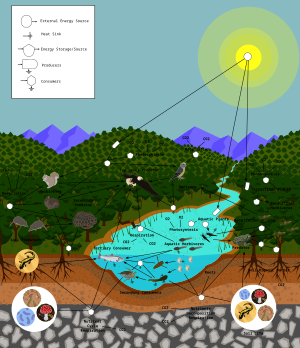Portal:Ecology
| |
|
|
Ecology
|
|
Ecology (from Ancient Greek οἶκος (oîkos) 'house', and -λογία (-logía) 'study of') is the natural science of the relationships among living organisms, including humans, and their physical environment. Ecology considers organisms at the individual, population, community, ecosystem, and biosphere levels. Ecology overlaps with the closely related sciences of biogeography, evolutionary biology, genetics, ethology, and natural history. Ecology is a branch of biology, and is the study of abundance, biomass, and distribution of organisms in the context of the environment. It encompasses life processes, interactions, and adaptations; movement of materials and energy through living communities; successional development of ecosystems; cooperation, competition, and predation within and between species; and patterns of biodiversity and its effect on ecosystem processes. Ecology has practical applications in conservation biology, wetland management, natural resource management (agroecology, agriculture, forestry, agroforestry, fisheries, mining, tourism), urban planning (urban ecology), community health, economics, basic and applied science, and human social interaction (human ecology). The word ecology (German: Ökologie) was coined in 1866 by the German scientist Ernst Haeckel. The science of ecology as we know it today began with a group of American botanists in the 1890s. Evolutionary concepts relating to adaptation and natural selection are cornerstones of modern ecological theory. Ecosystems are dynamically interacting systems of organisms, the communities they make up, and the non-living (abiotic) components of their environment. Ecosystem processes, such as primary production, nutrient cycling, and niche construction, regulate the flux of energy and matter through an environment. Ecosystems have biophysical feedback mechanisms that moderate processes acting on living (biotic) and abiotic components of the planet. Ecosystems sustain life-supporting functions and provide ecosystem services like biomass production (food, fuel, fiber, and medicine), the regulation of climate, global biogeochemical cycles, water filtration, soil formation, erosion control, flood protection, and many other natural features of scientific, historical, economic, or intrinsic value. (Full article...) Selected article - Theoretical ecology is the scientific discipline devoted to the study of ecological systems using theoretical methods such as simple conceptual models, mathematical models, computational simulations, and advanced data analysis. Effective models improve understanding of the natural world by revealing how the dynamics of species populations are often based on fundamental biological conditions and processes. Further, the field aims to unify a diverse range of empirical observations by assuming that common, mechanistic processes generate observable phenomena across species and ecological environments. Based on biologically realistic assumptions, theoretical ecologists are able to uncover novel, non-intuitive insights about natural processes. Theoretical results are often verified by empirical and observational studies, revealing the power of theoretical methods in both predicting and understanding the noisy, diverse biological world. The field is broad and includes foundations in applied mathematics, computer science, biology, statistical physics, genetics, chemistry, evolution, and conservation biology. Theoretical ecology aims to explain a diverse range of phenomena in the life sciences, such as population growth and dynamics, fisheries, competition, evolutionary theory, epidemiology, animal behavior and group dynamics, food webs, ecosystems, spatial ecology, and the effects of climate change. (Full article...)Selected image - Credit: Luc Viatour Grasslands are found in most ecoregions of the Earth. Above are grasslands near Elsrickle, South Lanarkshire, Great Britain.
General imagesThe following are images from various ecology-related articles on Wikipedia.
Related WikiProjectsThings you can do
Entries here consist of Good and Featured articles, which meet a core set of high editorial standards.
 In conservation biology, a flagship species is a species chosen to raise support for biodiversity conservation in a given place or social context. Definitions have varied, but they have tended to focus on the strategic goals and the socio-economic nature of the concept, to support the marketing of a conservation effort. The species need to be popular, to work as symbols or icons, and to stimulate people to provide money or support. Species selected since the idea was developed in 1980s include widely recognised and charismatic species like the black rhinoceros, the Bengal tiger, and the Asian elephant. Some species such as the Chesapeake blue crab and the Pemba flying fox, the former of which is locally significant to Northern America, have suited a cultural and social context. (Full article...)Selected biography -Lian Pin Koh (born 1976 in Singapore) is a Singaporean conservation scientist. He is Associate Vice President and Chief Sustainability Scientist at the National University of Singapore (NUS), where he oversees and champions sustainability-related research. He employs a whole-of-University strategy to bridge academia with policy makers, industry and civil society, driving the change needed across all sectors to tackle the twin planetary crises of climate change and biodiversity loss. By initiating and spearheading engagements with stakeholders locally and at international fora, Prof Koh seeks to promote societal understanding of the world we live in, and amplify the university’s and Singapore’s contributions to sustainability efforts globally. (Full article...)Did you know (auto-generated)
Selected quote -
Ecology news
Additional News Highlights
Selected publication -The Journal of Ecology is a bimonthly peer-reviewed scientific journal covering all aspects of the ecology of plants. It was established in 1913 and is published by Wiley-Blackwell on behalf of the British Ecological Society. The Journal of Ecology publishes papers on plant ecology (including algae) in both terrestrial and aquatic ecosystems. In addition to population and community ecology, articles on biogeochemistry, ecosystems ecology, microbial ecology, physiological plant ecology, climate change, molecular genetics, mycorrhizal ecology, and the interactions between plants and organisms such as animals or bacteria, are published regularly. (Full article...) Related portalsMore did you know -Related articlesAssociated WikimediaThe following Wikimedia Foundation sister projects provide more on this subject:
Web resources
Discover Wikipedia using portals |
















































